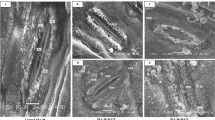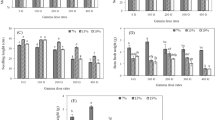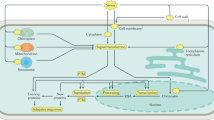Abstract
DR. J. C. MOTTRAM has recently1 described experiments in which he irradiated the root tip of broad beans and claimed to have confirmed the conclusion, arrived at by him in 1913, namely, that the dividing cell is more sensitive to radiation than the non-dividing cell.
This is a preview of subscription content, access via your institution
Access options
Subscribe to this journal
Receive 51 print issues and online access
$199.00 per year
only $3.90 per issue
Buy this article
- Purchase on Springer Link
- Instant access to full article PDF
Prices may be subject to local taxes which are calculated during checkout
Similar content being viewed by others
References
Mottram, J. C., Brit. J. Radiol., 6, No. 70, 615 ; 1933.
Love, W. H., Archiv. Exper. Zellforsch., 11, 463 ; 1931 ; and Proc. Roy. Soc. N.S.W., 66, 56 ; 1932.
Spear, F. G., Proc. Roy. Soc., B, 108, 190 ; 1931. 110, 224 ; 1932.
Strangeways, T. S. P., and Hopwood, F. L., Proc. Roy. Soc., B, 100, 283 ; 1926.
Author information
Authors and Affiliations
Rights and permissions
About this article
Cite this article
LOVE, W. Sensitivity of Dividing and Non-Dividing Cells to Radiation. Nature 134, 252 (1934). https://doi.org/10.1038/134252a0
Published:
Issue Date:
DOI: https://doi.org/10.1038/134252a0
Comments
By submitting a comment you agree to abide by our Terms and Community Guidelines. If you find something abusive or that does not comply with our terms or guidelines please flag it as inappropriate.



